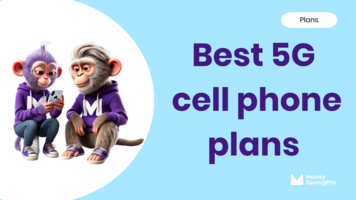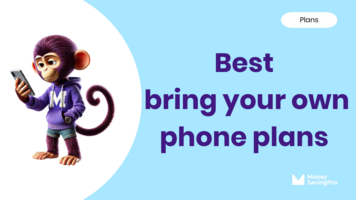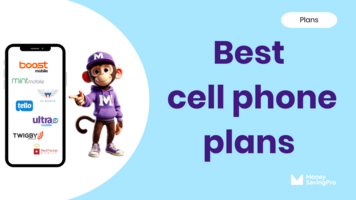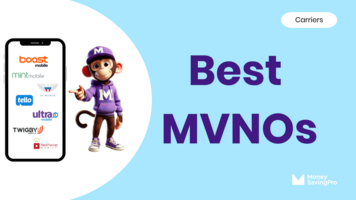Postpaid vs Prepaid: Which is best for you?
The key to finding the best value prepaid plan is all about leveraging the competitive rates offered by low-cost carriers. You'll get the same coverage for a fraction of the cost without hidden fees and price hikes. Here are the most affordable providers to consider.
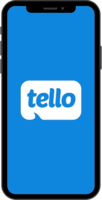
- T-Mobile 5G & 4G LTE wireless coverage
- Free international calling to 60+ countries
- Free mobile hotspot included
- Excellent score on Trustpilot
- eSIM compatible
- No international roaming
- No multi-line discounts

- Low-cost unlimited plans
- Unlimited talk & text to Mexico & Canada
- Mobile hotspot use included
- Taxes & fees included in price
- User-friendly website
- Only 2 plan choices
- Data speed is capped at 5 Mbps
- Limited phone compatibility
- App-based service
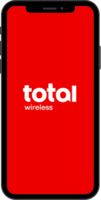
- Verizon 5G coverage
- Hotspot included
- Great phone deals
- International calling to 85+ destinations
- Roaming in Canada & Mexico
- Only unlimited data plans
- More expensive than others

- T-Mobile 5G & 4G LTE wireless coverage
- Free international calling to 60+ countries
- Free mobile hotspot included
- Excellent score on Trustpilot
- eSIM compatible
- No international roaming
- No multi-line discounts

- AT&T 5G & 4G LTE network coverage
- Free international calls to 80 countries
- Roaming available in Mexico and Canada
- Mobile hotspot access on all plans
- Excellent score on Trustpilot
- eSIM compatible
- Limited international roaming
Are you trying to decide on a prepaid or a postpaid phone plan? At MoneySavingPro, we've got you covered.
Whether a postpaid or prepaid cell phone plan would be best will vary depending on a number of things including if you like to keep up to date with the latest devices or if you're looking to save money.
We've selected some prepaid deals with MVNOs below and discussed the pros and cons of both postpaid and prepaid plans so you can choose the best option for you.
Tello offers the best phone plan for low data users

Tello 2GB plan for $10/mo
- T-Mobile 5G & 4G LTE network
- Unlimited talk and text with 2GB data
- Instant online activation
Looking for an easy way to cut your phone bill without losing reliable service? Tello offers one of the best low-cost options on T-Mobile's network.
You get unlimited talk and text, plus free international calls to 60+ countries (including Canada and Mexico). Tello's flexible approach allows you to build your own plan, selecting just the right amount of data, talk, and text to match your needs.
Get mobile hotspot use with every plan, but the unlimited plan is capped at 5GB. There are no discounts for multiple lines, but at these prices, bundling isn't necessary.
Getting started is seamless with eSIM. The activation takes just a few taps. Or you can order a physical SIM if preferred.
I also looked into other options. Ultra Mobile is a great choice for international calls but costs more for similar data. Metro by T-Mobile requires in-store activation and is more expensive. Boost Mobile has attractive pricing, but hidden fees and inconsistent service take away its appeal.
For an affordable, flexible, and commitment-free phone plan, Tello remains the top pick.
- Custom plans – Only pay for what you need, with no forced extras.
- Simple, transparent pricing – No contracts, no hidden fees.
- Easy setup – eSIM activation in minutes or a shipped SIM card.
Visible offers the best value unlimited data plan

Visible unlimited plan for $25/mo
- Verizon 5G & 4G LTE network
- Unlimited talk, text and data
- Instant online activation
Tired of complicated wireless plans? Visible keeps it simple with just two unlimited options, both with no contracts, no extra fees, and no hassle.
For $25/month, you get unlimited talk, text, and data, plus mobile hotspot access with speeds of 5–10 Mbps. If you need faster speeds and premium data, the Visible+ plan gives you 50GB of priority data and Verizon's 5G Ultra Wideband access.
International perks make Visible+ even better. It includes free international calling to 30+ countries and texting to over 200 destinations. Plus, eSIM activation lets you start service in just minutes.
Although multi-line discounts aren't available, Visible's low individual pricing ensures great value for single users. Just keep in mind that customer support is online-only.
Compared to Tracfone, Xfinity Mobile, and Spectrum Mobile, Visible stands out. Tracfone is cheaper but restricts data speeds. Xfinity Mobile and Spectrum Mobile have good pricing, but you must be an internet customer to sign up.
For no-fuss unlimited service with clear pricing, Visible is the best pick.
- Unlimited plans, no surprises – Simple, all-in pricing with no hidden fees.
- Built-in extras – Mobile hotspot included, plus free international calling & texting with Visible+.
- Instant activation – eSIM lets you switch in minutes, or order a SIM card.
Total Wireless offers the best phone plan with Verizon coverage

Total Wireless unlimited plan for $50/mo
- Verizon 5G & 4G LTE network
- Unlimited talk, text and data
- Instant online activation
Total Wireless keeps wireless service simple and affordable, offering no-contract plans with Verizon's coverage.
With unlimited talk and text, generous high-speed data allowances, and hotspot access up to 15GB, you get everything you need at a lower cost.
International features are built in with select plans include free calling to 85+ destinations and roaming in Canada and Mexico.
You can manage your plan easily online, with no activation fees, no contracts, and no hassle.
I compared other budget-friendly carriers on Verizon's network. Tracfone's pay-as-you-go plans limit high-speed data. Xfinity Mobile and Spectrum Mobile provide solid deals, but require home internet service.
For a cost-effective plan with Verizon's coverage and useful extras, Total Wireless is a smart choice.
- Verizon's coverage, lower price – Reliable service without the premium cost.
- Great extras included – Hotspot access up to 15GB on certain plans, plus free international calling & roaming.
- No long-term commitments – Manage your plan online with total flexibility.
Tello offers the best phone plan with T-Mobile coverage

Tello unlimited plan for $25/mo
- T-Mobile 5G & 4G LTE network
- Unlimited talk, text and data
- Instant online activation
Tello is all about giving you affordable wireless service without the headaches of big carrier contracts.
Every plan includes free international calling to 60+ countries, including Canada and Mexico, along with flexible data options tailored to your needs.
With Tello, you build your own plan-picking just the right amount of data, talk, and text. That means no paying for features you don't use. Every plan includes mobile hotspot access, with a 5GB limit on unlimited plans, and while multi-line discounts aren't available, individual pricing is so competitive that bundling isn't necessary.
Switching is fast and hassle-free-if your phone supports eSIM, you can activate your plan in just a few taps. If not, Tello will send you a physical SIM card for easy installation.
I looked at other options, including Metro by T-Mobile, Ultra Mobile, and Boost Mobile. Metro by T-Mobile requires in-store activation and charges more for similar plans. Ultra Mobile offers good international calling perks but costs more. Boost Mobile has attractive pricing but taxes and fees can vary and customer support is inconsistent.
For low-cost, no-commitment service with full flexibility, Tello is a standout choice.
- Personalized plans – Create a plan with just the right amount of talk, text, and data-no wasted money on extras.
- No hidden fees, no contracts – Pay month to month with transparent pricing and no surprise charges.
- Seamless activation – eSIM allows for instant setup, or you can get a SIM card shipped and activate at your convenience.
Red Pocket offers the best phone plan with AT&T coverage

Red Pocket unlimited plan for $30/mo
- AT&T 5G & 4G LTE network
- Unlimited talk, text and data
- Instant online activation
If you're looking for an unlimited plan for the whole family, Red Pocket Mobile offers major savings on AT&T's network.
You'll get a $20 discount per extra line, helping families cut costs while still enjoying premium network coverage. Although there's a small setup fee, the overall savings make it worth the switch.
Plans come with unlimited talk and text, no hidden fees, and up to 30GB of high-speed data, plus hotspot access for added flexibility.
For international users, Red Pocket Mobile includes free calls to 80+ countries and free roaming in Mexico and Canada, all at no extra cost. eSIM users also get a 7-day money-back guarantee, allowing them to try the service risk-free.
I reviewed other AT&T-powered budget carriers, including Cricket Wireless, which costs more despite being AT&T's own prepaid brand, H2O Wireless, which has international perks but isn't as competitively priced, and Good2Go Mobile, which offers lower prices but limited plan choices.
For an affordable unlimited plan with premium features and great family savings, Red Pocket Mobile is a top choice.
- Multi-line savings – Save $20 per extra line and lower your family's phone bill.
- Built-in global perks – Free calls to 80+ countries and free roaming in Mexico & Canada.
- No contracts, no surprises – Clear pricing with a 7-day eSIM refund policy.
How to choose the best prepaid or postpaid plan
What network coverage do you prefer?
Network access is a key consideration wherever you live, but especially in rural areas. Luckily, low-cost carriers operate on the same 5G & 4G LTE networks as major carriers. T-Mobile scores the highest for 5G coverage, according to an Opensignal 5G Experience Report (2023). If there is a particular network you prefer, choose an MVNO that operates on that network. Use our coverage checker to find the best cell phone service in your area.
How much data do you need?
Do you really need an unlimited data plan? The big wireless companies want you to believe so, but in reality, the average monthly cellular data consumption is around 10GB. However, if you spend most of your time at home or work on Wi-Fi, it's likely your cellular data usage will be much lower. You can choose a data plan tailored to your needs with cheap cell phone providers, meaning you can pay less if you use less. But if you do choose an unlimited data plan, be aware that high-speed data is normally capped.
Is hotspot data included?
Most carriers allow hotspot data usage but limit the amount of data that can be used via tethering. The limit depends on the carrier and plan you choose. Some carriers also offer data only plans so you can access the internet on mobile devices like iPads, tablets, and mobile hotspots when Wi-Fi's not available.
What's the monthly price?
While big wireless unlimited plans cost around $75-90 per month, the best MVNOs offer budget-friendly plans, ranging from $5-35 per month without sacrificing wireless coverage and data speeds. Watch out for hidden fees & taxes; some carriers include these in the price, and others, such as Verizon and AT&T, don't.
How many lines do you need?
With big wireless, you only get the advertised price if you buy four lines. With MVNOs, the price you see is the price you pay, even for one line. Many low-cost carriers now offer further discounts for multi-line plans.
Can I bring my own phone or buy a new device?
While the big three love keeping their customers locked into a constant phone upgrade cycle, MVNOs encourage you to bring your own phone. This means you take back control and only change your phone when it suits you. If you do want to purchase a new phone, many MVNOs offer an affordable and easy way with 0% financing over 1-2 years.
Are there any deals or promotions?
Big wireless promotions can seem good at a glance. But once you read the small print, it often leads to buying things you don't need and committing to 3-year phone contracts. Many MVNOs offer short-term introductory promotional pricing for new customers, and their pricing is much more transparent.
What perks or add ons can I expect?
Most big wireless plans include "free" TV subscriptions. Initially, these seem like a great deal. However, these usually turn into a paid subscription that is automatically added to your bill a few months down the line. A few low-cost carriers, such as US Mobile, do offer plan options with free subscription services, but we generally recommend keeping these subscriptions separate so you don't end up paying for things you don't need.
Is international calling included?
Most MVNOs offer free international calls to many countries. If this is important to you, make sure to choose a carrier that includes this.
Are there parental controls?
Some Mobile Virtual Network Operators (MVNOs) provide parental controls that allow parents to monitor their children's cell phone usage and data consumption. By using these features, you have the ability to establish limits on data usage, limit access to specific apps or websites, and even keep track of your child's whereabouts. These capabilities are accessible either through subscription plans or can be adjusted in the settings of your mobile device.
Check out our cell phone plan comparison to ensure you find the best deal.
AT&T prepaid vs AT&T postpaid
AT&T vs Boost Mobile comparison
Keep your AT&T phone, number & coverage: Save $600 per year
| Carrier | Network Coverage | 4G/5G Data | Price | Annual Cost |
|---|---|---|---|---|
| AT&T | AT&T 4G & 5G | Unlimited | $75/mo | $900/yr |
| Boost Mobile | AT&T 4G & 5G | Unlimited | $25/mo | $300/yr |
| Savings | $50/mo | $600/yr | ||
T-Mobile prepaid vs T-Mobile postpaid

- T-Mobile 5G & 4G LTE network
- Unlimited talk and text
- Unlimited data
T-Mobile vs Mint Mobile comparison
Keep your T-Mobile phone, number & coverage: Save $540 per year
| Carrier | Network Coverage | 4G/5G Data | Price | Annual Cost |
|---|---|---|---|---|
| T-Mobile | T-Mobile 4G & 5G | Unlimited | $75/mo | $900/yr |
| Mint Mobile | T-Mobile 4G & 5G | Unlimited | $30/mo | $360/yr |
| Savings | $45/mo | $540/yr | ||
Verizon prepaid vs Verizon postpaid

- Verizon, AT&T & T-Mobile 5G & 4G LTE networks
- Unlimited talk and text
- Unlimited data
Verizon vs US Mobile comparison
Keep your Verizon phone, number & coverage: Save $600 per year
| Carrier | Network Coverage | 4G/5G Data | Price | Annual Cost |
|---|---|---|---|---|
| Verizon | Verizon 4G & 5G | Unlimited | $75/mo | $900/yr |
| US Mobile | Verizon 4G & 5G | Unlimited | $25/mo | $300/yr |
| Savings | $50/mo | $600/yr | ||
What are the benefits of prepaid phone plans?
- No Contracts or Credit Checks. One great benefit is flexibility. Prepaid cell phone plans allow you to pay on a month-to-month basis, keeping you from getting locked into a contract you might not be able to afford or want later on down the line. Cheap prepaid cell phone plans are also available without a credit check for customers with low or no credit scores who are unable to qualify for long-term plans.
- Customized Plans. Many providers offer a flat monthly fee that gives you access to texting, talk time, and data. In addition, you can also sign up for services where you only pay for the days you use the phone. This flexibility gives you more control over which services you pay for, whereas, with a postpaid cell phone plan, you pay a specific amount per month for a blanket of services. This means you are paying for services you might not use.
- Easy Sign-Up Process. With prepaid cell phones, there are no credit checks or deposits you must pay to use the service. You simply buy the phone you want and the corresponding monthly service amount that best fits your needs. Conversely, with postpaid plans, the provider will check your credit to see if you have any outstanding balances with other cellular companies. If you have poor credit, they might allow you to obtain service, but you must pay a deposit first. This makes prepaid cell plans a better alternative if you have limited credit or have had financial problems in the past.
- No Termination Fees. With a postpaid cell phone, you can either buy a phone at a discounted rate with a two-year service commitment or finance the full price of the mobile device. In either instance, if you switch service providers before fulfilling your terms, you owe a balance to the company you left, which can result in hundreds of dollars. This is why a prepaid cell phone is a great alternative because you have the freedom to switch providers any time you choose, and you don't have to worry about paying costly fees to achieve this. While it's true that you will need to make a higher initial investment to obtain a phone with a prepaid plan, a smart money rule is to only buy what you can afford now, which is what this forces you to do.
- No-Risk. Because prepaid cell phones don't require a long-term commitment, there's no risk in simply trying the service to see if it's worth the savings. If you find that the coverage is too limiting or the service insufficient, you can always change your plan the following month.
What are the benefits of postpaid phone plans?
- Get the newest phones: As your 24-month payment plan nears its end, you may be eligible to upgrade to the latest and greatest cell phones. If you love technology and enjoy staying on the cutting edge of cell phones, a postpaid cell phone plan is for you. Some cell phone carriers even offer early upgrading.
- Never run out of data: No matter what postpaid cellphone plan you purchase, and no matter how many gigs of data are allotted to you, you'll never truly run out of data anymore. As of the time of this writing, all the major cell phone carriers provide extra data to users who exceed their monthly limit. You can be sure that you'll never run out of minutes, texts, or data.
- Extras and Bonuses: Not many prepaid cell phone plans have gotten on the bandwagon and offered special bonuses and services for their consumers. On a postpaid cell phone plan, you can find carriers that offer unlimited video streaming, cloud photo storage, hotspot capabilities, and more.
- Great for families: Postpaid cell phone plans are often perfect for families or large groups of people who want multiple lines tied to a single account and under one monthly bill. Many carriers offer specific family cell phone plans that you can see here.
Find the best cell phone service in your area
Prepaid carriers offer the best value for money
Now that I've discussed both kinds of cell phone plans, which one is better? Well, like most things in life: it depends.
Prepaid cell phones are a great fit if you are looking to control how much you pay for the services you use. While they do require an initial investment in buying the phone and service, over time, you won't have to worry about termination fees if you want to switch providers.
Best of all, obtaining a prepaid cell phone is easy since you don't have to worry about credit checks and deposits. This makes them a great option to consider if you want all the benefits of cell phone use without the high costs.
On the flip side, a postpaid cell phone is perfect for those who want to stay up-to-date with the most advanced devices, families with multiple lines, and large data users. You won't have to worry about refilling your minutes and data every month, and you can experience plenty of neat perks.
Ultimately, the best cell phone plan is the one that fits your lifestyle and budget and actually covers where you live.
Compare the cheapest prepaid phone plans
| Carrier | Network | Data | Price |
|---|---|---|---|
| Twigby Mobile 2GB plan | Verizon 5G/4G Coverage | 2GB | $5/mo |
| Twigby Mobile unlimited talk & text plan | Verizon 5G/4G Coverage | 0GB | $5/mo |
| Tello unlimited talk & text plan | T-Mobile 5G/4G Coverage | 0GB | $8/mo |
| Tello 1GB plan | T-Mobile 5G/4G Coverage | 1GB | $9/mo |
| Red Pocket 10GB plan | AT&T 5G/4G Coverage | 10GB | $10/mo |
Prepaid vs postpaid plans FAQs
Prepaid plans are no contract cell phone plans, so there's no commitment, and you have the freedom to change carriers or amend your plan if your needs change. The plans offer the flexibility to choose what features you want and only pay for what you'll use.
Prepaid cell phone plans with MVNOs come with a much cheaper price tag, plus there's no contract. With postpaid plans, you're normally tied into a contract of between 12-36 months, have expensive monthly costs, and an early termination fee is required if you want to cancel your contract.
MVNOS offering prepaid cell phone plans can offer lower prices because they are online based and don't have the expensive overheads of advertising, physical stores, or sales staff, so they like to pass on the savings to their customers via their plans.
Recap - Are prepaid or postpaid plans better?
It's a personal preference whether prepaid or postpaid plans are better, but there are pros and cons to both.
If you love upgrading your phone to the latest handset every 36 months, then postpaid plans are best, but if you're looking to save money, prepaid plans from low-cost carriers could save you hundreds of dollars a year.
Most of the low-cost carriers do offer cell phones, including the latest smartphones from Apple and Samsung, but you'd have to pay upfront for the phone. However, some do have an interest-free loan available to pay in installments.
Related Content
Phone plans guides

